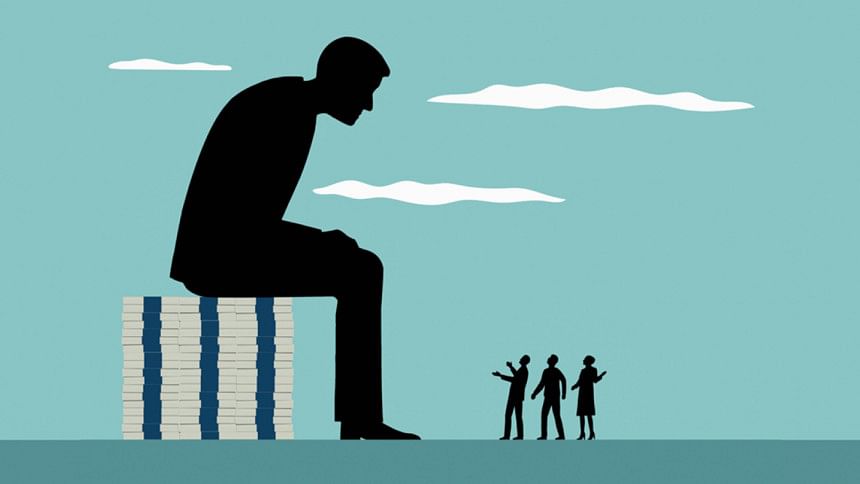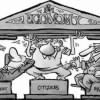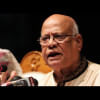Can mounting inequality be stopped?

Pre-budget discussion for the upcoming fiscal year (2018-19) is going on in the fast track. Even though the Finance Minister will present the budget in parliament after more than a month, business associations are meeting the Chairman of National Board of Revenue (NBR) almost every day. The NBR Chairman is giving some indications of the government's which used to come from the Finance Minister in the past. Understandably, the context is different this year. Most of the business associations are trying to derive benefits from the government before the general election. And the NBR seems to be convinced in considering their "legitimate" demands.
Nevertheless, both the business community and government are in principle nurturing the same opinion, which is to make the fiscal policy more business-friendly through undertaking reforms in corporate tax. Both the parties have the argument that since private business, trade and commerce are playing pivotal role in accelerating economic growth, formulating a business-friendly fiscal policy would promote further expansion of trade and investment in Bangladesh. According to the Bangladesh Bureau of Statistics (BBS), the growth rate of Gross Domestic Product (GDP) of the outgoing fiscal year (2017-18) is estimated to be 7.65, which has already surpassed the projection of the Medium-Term Macroeconomic Framework of the Ministry of Finance. Per capita income has increased to USD 1,752.
These statistics have placed the government in a fairly comfort zone before the elections. Therefore, the government does not have any genuine reason to disagree with the demands of the business community at such a "golden moment". However, the NBR Chairman has cautioned that the government's revenue may decline due to any downward revision of the corporate tax rate. Notwithstanding that possibility, the government will prepare the tax proposal keeping in mind the proposals of the business associations.
The impressive performance of economic growth of the recent fiscal years exposes us to a few powerful fundamental queries. Is this growth increasing job opportunities adequately? Is it increasing private investment with equal footing? Is it provoking income inequality?
According to the latest Labour Force Survey of BBS and study of Centre for Policy Dialogue, employment has increased annually by about 0.78 million over the last three and half years, which is lower than that of the preceding three years (2010-2013) when the GDP growth rate was lower. Employment has reduced in the labour-intensive agriculture sector. The highest employment (about 1.1 million per year) is being generated by service sector, which experience a growth rate lower than the GDP growth rate. On the other hand, industry especially manufacturing which is getting various fiscal benefits and achieving the highest growth rate (double-digit growth over considerable period) has been creating only about 85 thousand jobs per year. Therefore, it cannot be candidly concluded that the recent impressive economic growth rate is generally employment-friendly.
Is the corporate income tax rate excessive in Bangladesh? Which rate would below and business-investment friendly? There are common complaints from the business community and a group of scholars that private investment has been stagnant over the last couple of years. This complain is partly true. Even though as a ratio of GDP it has not increased by much, the truth is that at constant prices private investment has grown by 7.8 per cent in fiscal year 2016-17 and its estimated growth was 8.35 per cent in the outgoing fiscal year. This implies that the growth rate of private investment was higher than the GDP growth rate. But for a fast-growing economy like ours that is suffering from considerable deficiency of business-friendly physical infrastructure, for mega investment to take off it needs massive investment from public sector in large-scale projects (viz Padma Bridge and Metro Rail). This kind of public investment will naturally encourage more private investment.
Therefore, nobody should be worried by the investment-GDP ratio if the GDP growth rate remains impressive. If less amount of investment brings about higher GDP growth, it indicates that higher return is generated per unit of investment and efficiency of investment is on the rise. Moreover, Bangladesh will need to intensify public investment on large-scale physical infrastructure for sustainable graduation to a developing country. Conversely, the opportunity of soft loan from the World Bank and similar institutions will squeeze. So, this kind of public investment should be financed from domestic sources, specifically from increased government revenue. Since there is no hope of seeing magical improvements in personal income tax revenue, corporate income tax would be a good source vis-à-vis value added tax.
Indeed, in the election year, if benefit is granted in corporate tax through downward revision without a rigorous ex ante assessment, it would drive the NBR to a highly risky path of revenue generation. Which would be very difficult for the government to both escape and salvage later on, because if a tax benefit is granted once, it would create an unnecessary pressure later. In that case, an alternative is to reduce the cost of doing business. The prime minister has already asked banks to reduce interest rate in exchange of several important benefits that have been given to them. If implemented, it would be an instance of reducing cost of doing business. Similar instruments should be developed to foster business and attract investment.
The business community can claim that high corporate tax rate is a reason for private investment stagnating. Nevertheless, the first possible reason why the ratio of private investment to GDP is lower than the projection of the Seventh Five Year Plan (2016-2020) is "saturation effect". It means that the private investors are satisfied with the current level of investment. The second reason would be that a higher level of investment is excessively risky. The third possible reason would be lack of mega-investments in private sector. However, the recent large private investment and joint-venture in power, LNG and cement can introduce a new era by altering the traditional landscape of private investment. In other words, the country can witness a new age of private investment given the existing corporate tax structure.
Is the growing mega-investment in public and private sectors as well as the fragrance of impressive growth creating hope among the general masses for higher income and ownership of resources? The painful truth is that it is being concentrated among business community and high-incomehouse holds. The reason is mainly the existing income, especially corporate tax rate. An important principle of any tax structure is to achieve income equality through redistribution of tax revenue.
The results of Household Income and Expenditure Survey 2016 of BBS imply that the income and resource has concentrated abnormally among the business community. While the bottom 10 percent (extreme poor) had 2 percent share in total income in 2010, it has become just half (1.01 per cent) in 2016. Share of the bottom 20 percent (poor) has reduced from 5.22 percent of total income in 2010 to 3.84 percent in 2016. Conversely, the share of the top 5 percent (business people/rich persons) has increased from 24.6 percent in 2010 to 27.9 percent in 2016. Gini index of income inequality has increased from 0.458 in 2010 to 0.483 in 2016. Inequality has increased both in rural and urban areas. It implies that even if economic growth has been praised for its contribution in reducing poverty, escalating income inequality has produced a big question mark on its overall contribution to the economy and society. If not addressed through significant reform in fiscal policy, such tendency will continue to remain a formidable barrier to achieving the Sustainable Development Goal (SDG) 10 of arresting income disparity.
An effective means of reducing the reckless income inequality is to undertake a poor-friendly tax structure reform. Its main objective should be to increase income and ownership of resources of low-income population through redistribution, keeping the tax rate at an optimal level that does not discourage trade and investment. If income and resources of mass population do not increase substantially, their consumption and domestic market would not expand. The consumption items of high income people are usually luxury ones, which come from outside markets. Conversely, consumer items of mass people are normal goods, which mostly come from the domestic market. Therefore, increasing share of mass population would help increase the domestic economy, raise government revenue and accelerate economic growth.
Hopefully the NBR will effectively consider these aspects while making any decision on tax structure for the upcoming budget.
Dr Mahfuz Kabir is Acting Research Director at Bangladesh Institute of International and Strategic Studies (BIISS), Dhaka.
Email: [email protected]









Comments